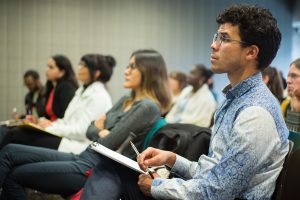
SJSU professors discuss faculty life, diversity and inclusion. (Photo: James Tensuan, ’15 Journalism)
By David Goll
Nearly 12 years after arriving in the United States from his native Spain, Eduardo Munoz-Munoz is preparing to start the next phase of his academic career this fall at San Jose State University. Munoz-Munoz will begin his position as a tenure-track assistant professor in the university’s Connie L. Lurie College of Education in August. An SJSU adjunct professor since 2014, his specialty is bilingual education.
He is one of 22 fellows engaged in Stanford University’s Diversifying Academia, Recruiting Excellence (DARE) Doctoral Fellowship Program that works to advance students from traditionally underrepresented racial, ethnic, gender and sexual orientation demographic groups who are investigating academic careers. Members of Stanford’s DARE program visited SJSU on March 1, meeting with university officials and faculty members as they weigh career options. For the past 10 years, the doctoral students have visited SJSU and other Bay Area universities to explore career options.
Munoz-Munoz earned a degree in English Philology from Spain’sUniversity of Cordoba, a master’s degree in Arts Education and an administrative credential from the University of California, Berkeley. He has lectured at Mills College in Oakland and Belmont’s Notre Dame de Namur University, and served as a principal in the Oakland Unified School District.
“I’m very happy to start my career at an institution where teaching is considered a major part of the work and doesn’t take a back seat to research,” Munoz-Munoz said. “As an educator with a political consciousness, I love working at a public institution (that is) working to empower public education. I love San Jose State because of the diversity and the commitment of students working hard to get a great education.”
In the 23-campus California State University system, only 27 percent of students identified as white in 2015, while 63 percent of faculty identified as such. SJSU has one of the most diverse student populations in the nation. According to Dr. Kathleen Wong(Lau), SJSU’s chief diversity officer, as of fall 2016, 42 percent of SJSU students were Asian, 24 percent Hispanic, 19 percent white, three percent Black, and 10 percent in the “other” category. Less than one percent identified as Native American or Pacific Islander.
In an effort to attract DARE members to SJSU careers, Wong(Lau) touted the university’s progressive credentials championing racial and economic justice.
“It’s a little-known fact the nationwide minimum-wage movement started here, as did the tiny-house initiative,” she said of a design for diminutive abodes for the homeless unveiled last year by SJSU students.
Wong(Lau) spoke proudly of the university’s statue honoring former students and track athletes John Carlos and Tommie Smith, who famously raised their fists in protest during their medal ceremony at the 1968 Olympic Games in Mexico City.
“It was more than just about racial equality,” she said. “They were also passionate about economic inequality in this country.”
Another speaker at the DARE event was Dr. Magdalena Barrera, SJSU associate professor of Mexican-American Studies and faculty-in-residence for Diversifying the Faculty.
“The university has redoubled its efforts to diversify the faculty,” she said. “It’s so important we move in that direction because of the changing demographics of students.”
Hiring committee members for faculty recruitments now undergo a two-hour diversity training session designed by the Office of Diversity, Equity and Inclusion and Faculty Affairs.
On March 1, DARE visitors heard from a panel of faculty members about their SJSU careers. They all praised the ability to teach, conduct research, scholarship or creative activities, and participate in service projects. Some described it as a tough balancing act.
“I’m still working on balancing teaching, research, service and my personal life,” said Dr. Patricia Lopez, in her third year as an assistant professor in Educational Leadership. “My family, none of whom are in academia, keep me grounded. I am doing something I love and am an employee of the state of California, with the benefits that brings.”
Dr. Carlos Garcia, professor and department chair of Sociology and Interdisciplinary Social Sciences, also talked with the DARE Fellows.
“Despite the challenges of living in Silicon Valley, and despite the challenges that are part of working at a university such as ours, we are still lucky to be in the place that we are and to have the positions we do,” he said.